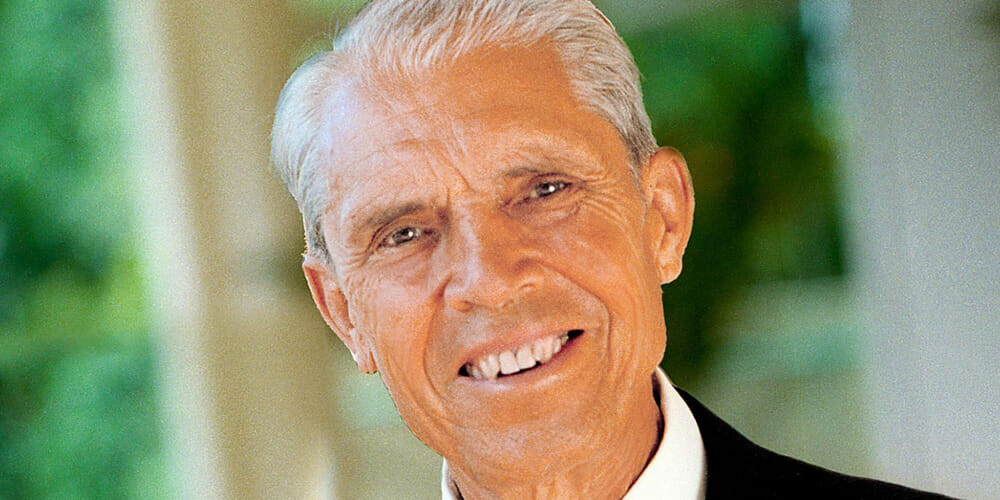A former student and theologian sheds light on the life and ministry of Desmond Ford, who died this week at 90.

From 1968 to 1970 I was a student at Avondale College in Australia, where Desmond Ford was head of the theology department. He was a charismatic preacher with a phenomenal memory. I spent many hours in his classroom and still consider him one of the best teachers I have ever had.
Ford was born into an Anglican family in Queensland, Australia. He developed early a love for books, and at age 14 he started working at a newspaper office in Sydney. One of his father’s cousins was a Seventh-day Adventist, who took an interest in Desmond. He was baptized into the Seventh-day Adventist Church in 1946 at age 17. A few months later he resigned from his job at the newspaper office, and at the beginning of 1947 he began his studies for the ministry at Avondale College. He was a brilliant student and graduated from the ministerial course in 1950. He began his ministry in North New South Wales. In 1952, he married his college sweetheart, Gwen Booth, with whom he had three children (Elènne, Paul, and Luke).
His articles in various church papers convinced leaders that Desmond Ford was a future college teacher. After Ford completed his BA in 1958, the family was sent to America, where he completed an MA at the Seventh-day Adventist Theological Seminary and a PhD at Michigan State University. At the beginning of 1961, the family returned to Australia, and for the next ten years Ford taught theology at Avondale, wrote many articles, and was a sought-after preacher and camp-meeting speaker.
The Righteousness by Faith Controversy
Confronted with Robert Brinsmead’s perfectionism, Ford began to emphasize the topic of righteousness by faith. He declared that righteousness by faith is the same as justification by faith. Justification, he explained, is Christ’s work for us — on the cross. It happens outside of us; it is a change of status. Through justification we become children of God. Sanctification, on the other hand, is Christ’s work in us through the Holy Spirit. Sanctification changes us into the likeness of Christ. This ran counter to the general Adventist understanding at that time, that righteousness by faith includes justification and sanctification.
In April 1970, his first wife, Gwen, lost her battle with breast cancer. After her death, Ford applied for study leave and was granted leave to go to the University of Manchester to begin a PhD in New Testament under F. F. Bruce. Prior to leaving for England in 1971, Ford married Gillian Wastell, a student at Avondale, who had helped look after Gwen.
After the family’s return from England in 1973, opposition to Ford’s teaching from some Australian evangelists and pastors led to a gathering called the Palmdale Conference in California, April 23-30, 1976. At this conference, nineteen scholars and administrators from Australia and the United States discussed the definition of righteousness by faith. The official report of the Palmdale Conference, published in Adventist Review, contained a clear biblical statement on righteousness by faith, but also some ambiguous statements. Both sides, therefore, could claim that the statement supported their position. However, most Adventist scholars and pastors today have accepted Ford’s definition of righteousness by faith.
The Sanctuary Controversy
Because the complaints against Ford’s teaching on righteousness by faith and on the nature of the sanctuary in heaven mounted, it was thought best to remove Ford temporarily from the Australian scene and have him spend some time at Pacific Union College, with which Avondale had an affiliation agreement.
Ford began teaching at PUC in the autumn of 1977, and on Saturday (Sabbath) afternoon, October 27, 1979, he presented a lecture on the investigative judgment to the Angwin chapter of the Association of Adventist Forums, in which he denied any biblical support for this doctrine. The church’s leadership responded by summoning Ford to a meeting of more than 100 theologians and church administrators at Glacier View Ranch in Colorado in August 1980 to evaluate his 991-page document entitled “Daniel 8:14, the Day of Atonement, and the Investigative Judgment.”
The Sanctuary Review Committee considered Ford’s document, wrestled with its implications, and concluded that while Ford was asking the right questions concerning the sanctuary teaching, his answers and conclusions were wrong.
His credentials as an Adventist teacher were removed. With the help of some Adventist friends, Ford established an independent ministry called Good News Unlimited with headquarters in Auburn, California. For about twenty years, until his retirement in 2000, Ford traveled the world preaching and teaching. During his life he published more than twenty books and over one hundred articles. In 2000, he and Gillian returned to Australia to live near his daughter Elènne’s home in Queensland. He passed away on March 11, 2019, at the age of 90.








